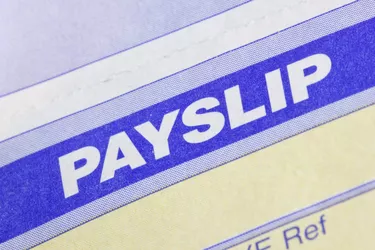
Wage garnishment, or an earnings withholding order, is a legal means for recovering a debt. As a landlord, you may need to recoup back rent through wage garnishment when a tenant fails to deliver rent checks as promised and otherwise fails to pay you. However, you need the court's help to garnish wages for back rent. You must sue your tenant, win a judgment and get a court order to recover payment directly from a tenant's earnings.
When A Tenant Owes You
Video of the Day
Although part of the eviction process involves requesting unpaid rent, you don't need to evict a tenant to get a court-ordered wage garnishment. You can garnish arrears from a tenant who didn't pay rent from an earlier date, or who left a rental owing money, up to several years after the initial delinquency. Rather than go through the eviction process -- or should you fail to obtain a judgment and wage garnishment through eviction -- you may be able to sue the tenant in small claims court and get an earnings withholding order. Small claims court doesn't require an attorney, but you have a certain amount of time to file a suit -- usually 3 to 6 years -- depending on your area's statute of limitations.
Video of the Day
Key Steps to Getting A Wage Garnishment
The basic process for collecting back rent via wage garnishment is generally the same across the country, although specific rules may vary by state and even from county to county. Typically, you need the following to obtain a court-ordered wage garnishment:
- Employer information for tenant
- Writ of execution from the court
- Application for an earnings withholding order
- Earnings withholding order form
- Payment of applicable filing fees
A writ of execution is a court order that enforces payment of a judgment when the debtor fails to pay. You can get a writ of execution if he doesn't pay within a specified amount of time or doesn't make payment arrangements.
Limits on Wage Garnishments
If your tenant is unemployed or self-employed, you may have a hard time getting a wage garnishment. Also, federal and state law limit the amounts you can garnish. You can't garnish more than 25 percent of the tenant's net pay and if the tenant has other creditors with garnishments, you may have to wait to get paid. Also, low-income tenants have certain protections which can prevent you from garnishing the full 25 percent. Your state may have stricter limits than the federal law and protect still more of the tenant's income.
Considerations When Garnishing
You can't garnish wages for back rent in North Carolina, South Carolina, Pennsylvania and Texas. State garnishment laws may allow only certain debts to be garnished, such as child support. Although wage garnishment, or even the threat of garnishment, can compel a tenant to pay you back rent, garnishing can also backfire, warns the legal website Nolo. The tenant can quit her job or file for bankruptcy to circumvent a wage garnishment.